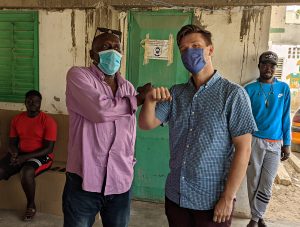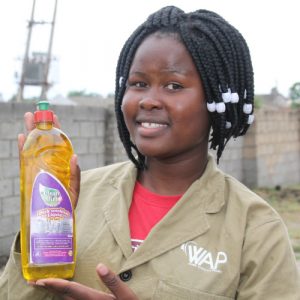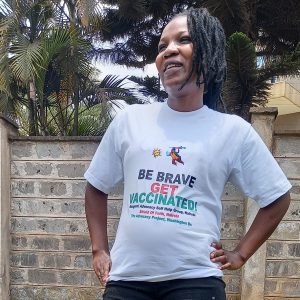2021 Start-ups and Projects
In 2021 The Advocacy Project transferred $63,815 to the 27 community projects and initiatives listed on this page. Most were designed by survivors of discrimination. Almost all were directed and managed locally, by an AP partner.
The projects fall into three categories: Start-ups; Phase 2; and Long-term. Start-ups last between three and six months. Working remotely from the US, or in the field, AP helps the partner to draw up a budget, set goals, and draft an MOU. We will also offer up to $1,000 in seed money. We then help the partner to track outputs on a weekly basis. Each project is supported by a team of one or more Peace Fellows.
If the goals of the start-up are met and the partner so requests, we will help to scale the startup and move to a Phase 2 project (6 months to 18 months). If these goals are met we will work with the partner to develop a long-term program (3-5 years).
This page presents a summary of projects supported so far in 2021, and estimates the funds they had received from AP by June 30, as well as the number of beneficiaries (direct and family members). We put the total number of beneficiaries at around 18,000. The data will be updated in early 2022.
Visit our team page to learn more about the Fellows who worked on these projects.
|
|
Use Soap To Empower Girls in ZimbabweWomen Advocacy Project helps 80 girls, including Trish Makanhiwa, to make and sell Clean Girl soap so as to reduce their vulnerability to early marriage. By end November, they had met their production target of 16,000 bottles for the year and sold 13,702 bottles. Profits so far this year have come to $9,643 shared equally between the girls and WAP. AP helped to secure funding for the program from Together Women Rise and represented WAP at 13 meetings in March with TWR chapters in the US. AP has also convened weekly Zoom meetings between the WAP girls in Zimbabwe and students from the Wakefield High School in Arlington, VA. Read how soap can protect against early marriage and meet the WAP girls at work and play in WAP’s video. Supported from the US by Abby Hack and Sarina Maini. AP has transferred $15,980 to WAP in 2021 as WAP’s fiscal agent. Beneficiaries – 400. |
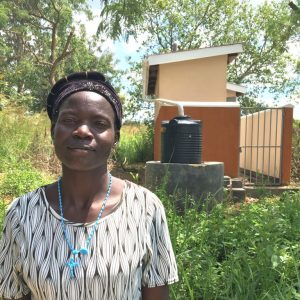 |
Improve Hygiene and Lift Enrollment in Ugandan Schools(On hold). The Gulu Disabled Persons Union (GDPU) will install accessible toilets and hand-washing at a primary school in Gulu district, Uganda when schools re-open early in 2022. This will be the fifth school to benefit from the program. Read more about the program, beneficiaries and past projects. The designated school is Lapuda, led by Principal Evelyn. Watch our movie about the appalling state of toilets at Lapuda. The WASH program is funded by the Prince of Peace Lutheran Church in Dublin, Ohio and the North Kingston Rotary Club. Supported from AP by Peace Fellows Anna Braverman and Saliha Gozel. Transferred by AP – $304. Beneficiaries – 1,760 students and family members. |
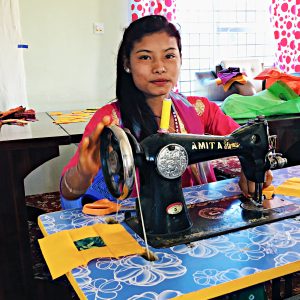 |
Support Families of the Disappeared in Nepal
AP has supported the Network of Families of the Disappeared in Nepal (NEFAD) since 2015. Since 2015, we have helped family-members of the disappeared, like Alina in Bardiya, to tell their stories through embroidery and produce two memorial quilts, a COVID quilt, and sample Tiger bags. We have also commissioned embroidered designs of Nepali festivals which we hope can be commercialized. We also continue to support NEFAD’s advocacy for transitional justice. In 2020 we submitted a report to the UN Human Rights Council on behalf of NEFAD and published blogs and podcasts by NEFAD and by AP on the topic. Watch our movie of the quilts being made; view profiles of the artists and their designs; read about NEFAD’s advocacy. Supported from AP by Peace Fellow Prabal Thapa. Beneficiaries – 15. |
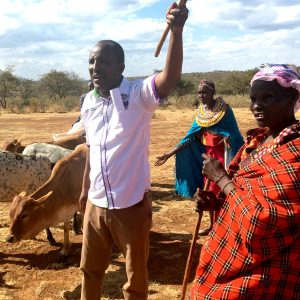 |
Protect Pastoralists in Kenya Against Climate Change and ConflictAP has supported Children Peace Initiative Kenya’s highly successful program to promote peace among pastoralists in Northwest Kenya since 2015. After helping to secure long-term funding from the German Foreign Office for CPIK, we are now helping CPIK to expand its international network. Peace Fellow Savannah Kopp is researching the impact of climate change on pastoralists which we explore in this recent news bulletin. We hope to nominate CPIK’s inspiring founder, Hilary Bukuno, for a Nobel Peace Prize and support a CPIK application to join the Alliance for Peace-Building. CPIK is forming a 501c3 nonprofit in the US to mobilize its existing contacts. AP posted an appeal for CPIK in March 2021 that raised $1,150 and provided emergency supplies to Turkana and Samburu pastoralist family members. Transferred by AP – $1,396. Beneficiaries – 1,190.
|
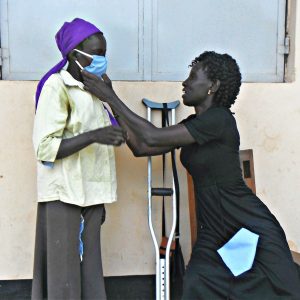 |
Create a Business for Mama Masks in UgandaIn 2020, AP funded Mama Cave, a tailor with limited mobility in Gulu to produce face-masks (Mama Masks) for persons with disability during the first wave of the pandemic. The investment paid off and her team made 1,100 masks. Encouraged, GDPU and Mama Cave set a target of 4,000 masks for 2021. This was put on hold when the government flooded the market with free masks but Mama Cave continued to show ingenuity and began offering her masks to NGOs with tailor-made logos. Her first clients were two AP partners in Nairobi. Mama Cave secured a commission to produce 400 masks for a school in Gulu but this was put on hold when the principal died from COVID-19. Supported from AP by Peace Fellows Anna Braverman and Grace McGuire. Transferred by AP – $797.50. Beneficiaries – 15. |
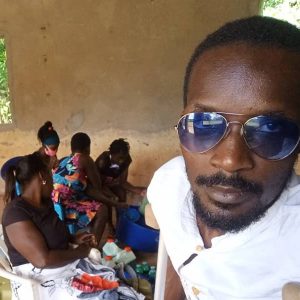 |
Produce Clean Wash Soap for Schools in UgandaIn 2020, AP invested in a soap start-up led by Freeman, a soap-maker with limited mobility in Gulu. Freeman’s 4-person team produced and sold 650 liters of Clean Wash soap and supplied persons with disability during the first wave of COVID-9. Based on this, we set a target of 6,000 liters in 2021. The team produced 500 liters, and supplied several schools, before the second wave hit and Freeman himself became ill. We hope to resume the project when the lock-down eases and find a sustained market in primary schools, starting with the four schools that have installed GDPU’s WASH package. Supported by Peace Fellows Anna Braverman and Saliha Gozel from AP. Transferred by AP – $493.50. Beneficiaries – 20. |
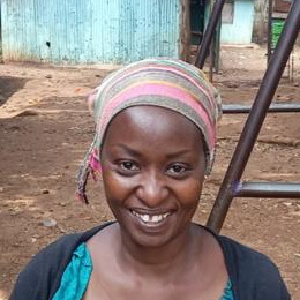 |
Use Composting to Grow Vegetables in Kibera, Nairobi
Working with Stella Makena at the Tandaza Trust in Nairobi, AP is supporting an experimental start-up to help women use composting and vermiculture in the informal settlement of Kibera. The project now comprises 14 composting sites. The goal is to compost 500 pounds of food waste by end 2021; and by end November they had composted 375 pounds. Eleven families now manage kitchen gardens, and the vegetables produced account for 30% of the families’ food. Together they have also produced over 200 liters of worm fertilizer (leachate) which they will bottle and sell. Several single mothers have been composting at a farm at Kariokor which also employs street boys. We will be seeking partners for Phase 3 early in 2022. Supported by Delaney Rogers and Beliz Aluc from AP. Transferred by AP – $3,580. Beneficiaries – 230. |
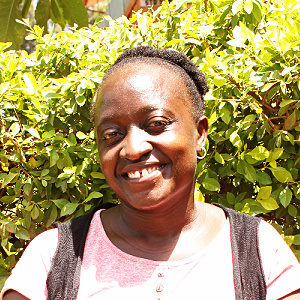 |
Build an Embroidery Business in Kangemi, NairobiCaren Mbyaki first met AP in late 2019 during the making of the Women’s World quilt at ICPD25. In 2020, AP invested in an embroidery start-up to help Caren’s group produce blocks for Sister Artists 2. These were completed with flair and AP agreed to support a phase 2 project to develop an embroidery business. Caren’s group honed their skills by producing 25 COVID designs in early 2021 and they are now making sample embroidery that will be offered for sale to fabric stores in the US. During training, the 25 artists formed the Kangemi Self-help Advocacy Group and secured legal status. This will enable them to advocate for services in the overcrowded settlement. Supported by Peace Fellows Ryan Pham and Saliha Gozel from AP. Transferred by AP – $2,081. Beneficiaries – 125. |
|
|
|
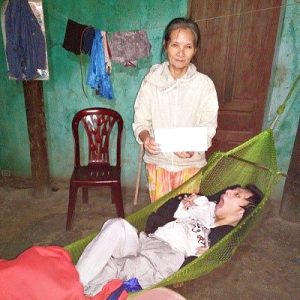 |
Support a Family Sickened by Agent Orange in VietnamAgent Orange has taken a terrible toll on the Cao family in Quang Binh province, as it has on millions of other Vietnamese. All three children – Van, Xuan and Ngoc – were born with serious intellectual and physical disabilities. Toa Cao and his wife Luan can only grow enough food for seven months in the year and are unable to pay for medical bills. AP has raised $1,470 to purchase a cow for the family; this will provide the family with sustained income from milk, calves and rent. The project is managed by AP’s partner, the Association for the Empowerment of Persons with Disabilities (AEPD). AP has raised over $17,000 for 12 Agent Orange families since 2015. Supported by Peace Fellow Ryan Pham from AP. Transferred by AP – $854. Beneficiaries – 5. |
Advocating for vaccines and vaccinations in NairobiAbigael Kwamboka is an active member of the Kangemi Advocacy Self-Help Group, which was formed in 2020 by Caren Mbyaki from the embroidery story-telling project to work for change in the Kangemi settlement. Vaccines have been slow to reach Kenya and when family members started to contract the virus in August the group decided to act. With Caren in the lead, they used WhatsApp to encourage each other to get vaccinated and then took their outreach to the community. By end October, they had persuaded 891 neighbors to get vaccinated. AP has sent the first Kenya COVID quilt to Nairobi for use in the campaign and has offered $250 for tests and vaccinations. Transferred by AP – #1,307. Beneficiaries – 125. |
|
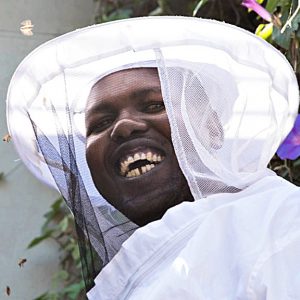 |
Beekeeping by the visually impaired in Uganda
AP has invested in HIVE Uganda which helps persons with visual impairment to learn beekeeping and sell honey. HIVE was founded by Ojok Simon, who also sits on the board of the Gulu Disabled Persons Union and has worked closely with AP Peace Fellows since 2008. Simon lost his sight when he was attacked and beaten by rebels from the Lords Resistance Army and has dedicated his life to empowering others with serious visual impairment. AP is investing $1,062 in five beekeepers, who plan to produce and sell 150 kilos of honey each by May 15, 2022. Transferred by AP – $527. Beneficiaries – 25. |
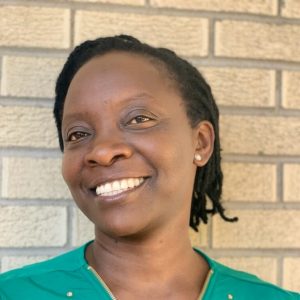 |
Empower Survivors of Forced Marriage in UgandaAP is helping Victoria Nyanyjura to launch a startup for women who were kidnapped by the Lord’s Resistance Army and forced into marriage. Years later, many have still not recovered. Victoria’s organization, Women in Action for Women (WAW) has used funding from AP to train ten members in embroidery story-telling. They described their ordeal through powerful blocks, which have been brought back to the US by Peace Fellow Anna Braverman and are being assembled into an advocacy quilt in the US. The WAW artists have also produced embroidered blocks for a bread quilt which are being assembled, and will shortly start working on telling the story of COVID through embroidery. Watch Victoria’s powerful statement to the 2014 conference on Human Security, where she described her years of captivity and abuse. Transferred by AP – $4,325. Beneficiaries – 50. |
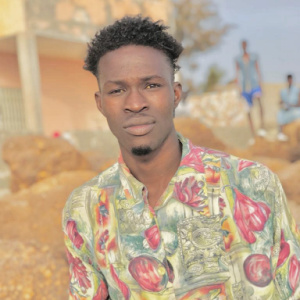 |
Support Returned Migrants in SenegalAma Ndiaye Thiombane, AKA Papa Mbissa Boy, is a rap artist from Senegal. He is also one of thousands of young men from West Africa have risked their lives in an attempt to reach Europe, only to meet disaster or return frustrated. Peace Fellow Jeremiah Gatlin (top photo) worked with three associations in Senegal that represent returned migrants in the Dakar area: OPEN SARL, Mouvement Jeunesse Nouvelle Vision and Naatal Sendou “Développer Sendou.” Jeremiah’s project produced powerful blogs; a first-rate video from footage shot by the emigrants; a rap song recorded by Papa Mbissa Boy; a news bulletin; and eight poignant embroidered stories by family-members of migrants, which show their relatives drowning at sea. Jeremiah was supported in the US by Avyan Mejdeen. Transferred by AP $1,734. Beneficiaries – 40. |
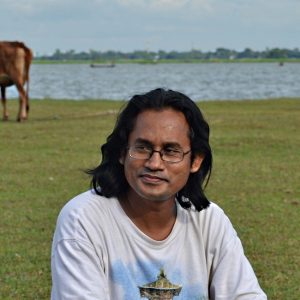 |
Improve the Food Security of River Gypsies in BangladeshAP is helping Shahed Kayes, founder of the Subornogram Foundation in Bangladesh, to prevent starvation on the island of Mayadip in the Meghna River while also providing employment for day laborers. Most of the 205 families on Mayadip depend on fishing. AP has purchased a fishing boat (Mayadip) for Subornogram that has empl0yed 20 crew members from the poorest families in the first ten weeks of the project. They have kept half the fish they caught. The rest was used to pay for a feeding kitchen which has provided one cooked meal a day to 80 vulnerable individuals so far. Read how AP helped Shahed to end shocking violence against the Gypsies; learn about Gypsy culture through the River Gypsy Quilt. The project is supported by Abby Hack, Delaney Rogers and Ryan Pham from AP. Transferred by AP – $1,354. Beneficiaries – 120. |
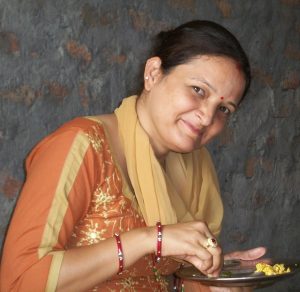 |
Strengthen the Tharu Against COVID-19 in NepalPinky Dangi is a senior manager at Backward Society Education (BASE), a long-time AP partner that works for the Tharu in Midwest Nepal. Pinky headed a successful 3-month campaign by BASE/AP start-up to protect Tharu villages against a devastating spike in COVID-infections. Working in 60 villages, the project trained 60 BASE volunteers to advise about social distancing; funded a medical team to do Antigen testing in all 60 villages; and provided PPE kits and oximeters for three local government health workers. The program inspired action throughout Dang District, and by the end of September infections in Dang had fallen to 134 a month from 588 and vaccinations had rose to 194,375 – a sharp rise on the 27,739 doses given out in June. BASE and AP hope that this will strengthen the villages against future waves of the virus and other medical crises. Read more about the COVID crisis and the response by BASE. Delaney Rogers and Prabal Thapa provide support from AP. Transferred by AP – $6,288. Beneficiaries 12,000 (estimate). |
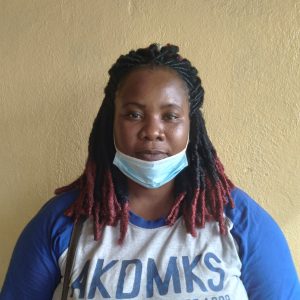 |
Surviving Ebola in LiberiaPeace Fellow Matthew Nyanplu volunteered at the National Ebola Survivors Network of Liberia in Monrovia, where he helped twelve survivors to recall their experience of Ebola through embroidery. The blocks are being assembled into a quilt in the US and will be used by the Network to advocate for survivors. The stitching group was led by Lulu Richards. Many have still not completely recovered and Matthew described their problems through a series of powerful blogs which included an interview with Liberia’s former President Ellen Sirleaf Johnson. Read our news bulletin about Matthew’s excellent work. Mathew was supported in the US by Beliz Aluc. Transferred by AP – $1,347. Beneficiaries – 60. |
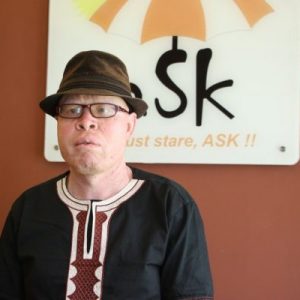 |
Tell the Story of Albinism in KenyaAP is helping Daniel Shisia, program head at the Albinism Society of Kenya, to develop a start-up to help twenty mothers of children with albinism describe the challenges facing people with the condition. These can range from violence and discrimination to skin cancer. The project is also supported by the Tandaza Trust in Nairobi. The twenty women who participated came from all over Nairobi and began by telling their story through embroidery. Their blocks are being assembled into an advocacy quilt which will be used by ASK to advocate for protection against skin cancer and support a project to produce and sell bucket hats. Delaney Rogers and Avyan Mejdeen provided support from AP Transferred from AP – $2,067. Beneficiaries – 100. |
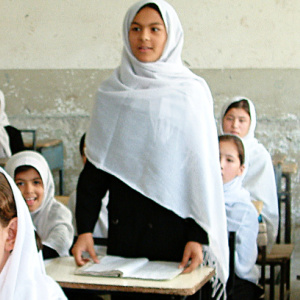 |
Support Women’s Education in AfghanistanThe collapse of the Afghan government, and the withdrawal of Western civil and military forces on August 15 exposed women and girls to serious risk. AP offered immediate support to the Oruj Learning Center, a partner since 2003 which put 3,470 girls through school between 2003 and 2009 and opened a university in Kabul in 2011 which currently has 912 students. AP amplified Oruj’s message through a news bulletin that was widely read. We then promoted a fundraiser by Oruj that netted $11,364 in a single day. AP donated $300. We continue to support Oruj’s efforts on behalf of further education in Afghanistan and Afghan refugees. Transferred by AP – $300. Beneficiaries – 912. |
|
|
|
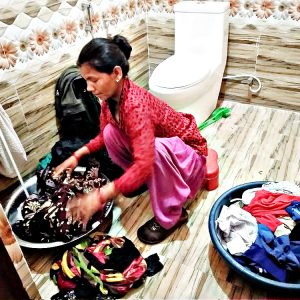 |
Empower Dishwashers in Nepal(On hold) Neema is one thousands of women and girls who work as dishwashers in Midwest Nepal. Neema’s life is one of exploitation and anxiety. Her work-day lasts up to 16 hours, for which she earns around $4. COVID claimed the life of a daughter, adding tragedy to hardship. There has been little publicity about the plight of dishwashers, but this silence is one reason they are abused. In the course of exposing the problem, BASE hopes to empower the dishwashers and provide them with more economic security. Prabal Thapa supports from AP. Beneficiaries – 125. |
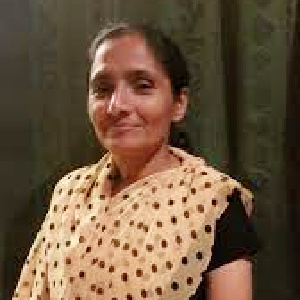 |
Emergency Oxygen for Nepal During COVID
AP has donated to an emergency appeal for oxygen in Nepal, at the height of a devastating second wave which struck the country in June. The appeal was launched by Radha Paudel, head of the Global South Coalition for Dignified Menstruation and a leading advocate against chhaupadi, the practice of banishing women and girls to a cowshed during menstruation. Radha’s campaign has reached 108,00 villagers in 12 districts. Transferred by AP – $277. |
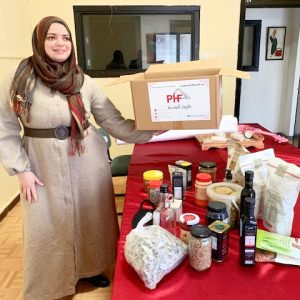 |
Emergency Support for Palestinians during the COVID crisisAP has donated to a COVID appeal by our Palestinian partner, the Palestinian House of Friendship in Nablus. This enabled PHF to distribute 10 Boxes of Love to needy families that containrice, flour, cooking oil, blankets, masks, hand-sanitizer, and soap. PHF has given out 60 boxes in total. AP has also protested against Israel’s policy of withholding badly needed vaccines from the Palestinian West Bank and Gaza. Transferred by AP – $517. Beneficiaries – 50. |
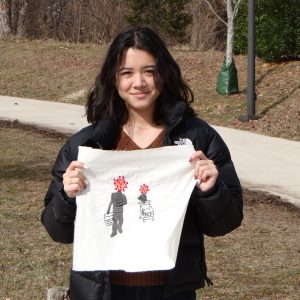 |
Tell the Global Story of COVID Through Embroidery
Kate Lanman from the Wakefield School in Arlington VA is one of 189 fiber artists from Zimbabwe, Nepal, the US and Kenya who have described their experience of COVID-19 through embroidery under a global AP initiative. The project is funded by Humanity United and has produced three spectacular quilts which were displayed at the Cameron Art Museum in Wilmington on April 22, 2021. The quilts and artists also featured in the first-ever digital exhibition of advocacy quilting on June 3. Supported from AP by Abby Hack and Bobbi Fitzsimmons. Transferred by AP – $3,752. Beneficiaries – 945. |
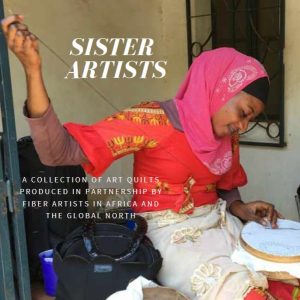 |
Quilt CataloguesAP hopes to produce four printed catalogues in 2021, modelled on Sister Artists 1. These will feature The COVID quilts; Sister Artists 2; AP’s entire collection of advocacy quilts; and a bread quilt that is being made by Women in Action for Women in Uganda. The catalogues are being designed by Miriam Correia at AP. |
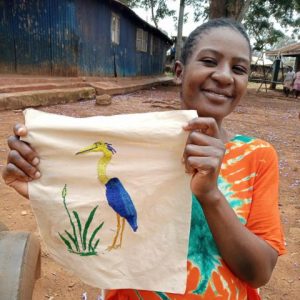 |
Sister Artists 2 – Auction Animal Quilts from KenyaCatherine is one of 45 Sister Artists from the Kangemi and Kibera settlements in Nairobi who have made embroidered squares about wildlife in Kenya. Quilters in the North are turning the squares into art quilts and we hope to auction their quilts in the Fall of 2021. Proceeds will go to the artists, who are supported by the Kangemi Self-Help Advocacy Group and the Tandaza Trust. Supported from AP by Bobbi Fitzsimmons, Abby Hack and Grace McGuire. Transferred by AP – $5,727. Beneficiaries – 225. |
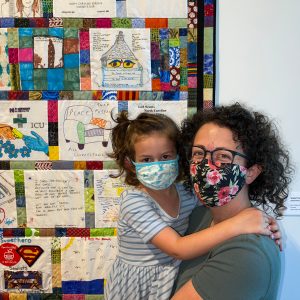 |
Strengthen a Community Museum during COVIDSadie Thomas, 4, and her mother Dorothy were among 125 supporters of the Cameron Art Museum who made COVID stories out of embroidery and attended an exhibition of COVID quilts at the Museum on April 22. The project helped the Museum to stay open throughout the pandemic and raise morale among the Wilmington community. Three quilts have been assembled from the 125 Wilmington squares and will be posted online. Supported by Bobbi Fitzsimmons and Abby Hack from AP. Transferred by AP – $517. Beneficiaries – 945. |
|
|

